AugurCon Keynote 2022: Up With the Birds
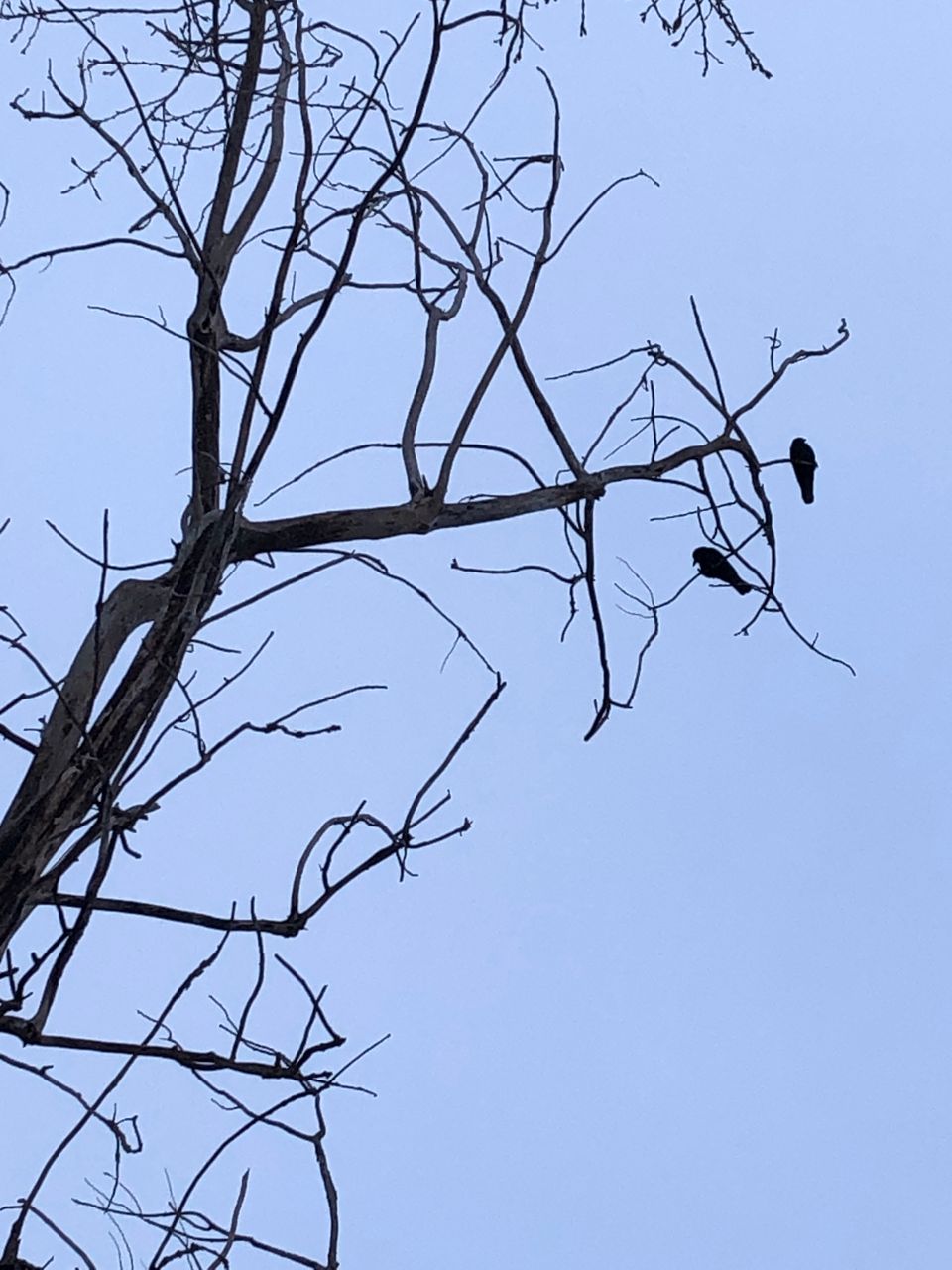
Dear Readers,
What follows is the transcript – edited and condensed for clarity – of a keynote talk I was invited to give during AugurCon, a virtual 2-day convention that took place last November organized by the staff of Augur Magazine. It's a little rambly and a little long, but it's about a lot of things I've had on my mind for months: anxiety and paranoid reading, what does the word "community" really mean, how do we live with each other on the internet, etc.
Mostly, though, it's about birds.
I hope you enjoy it!
All best,
Amal
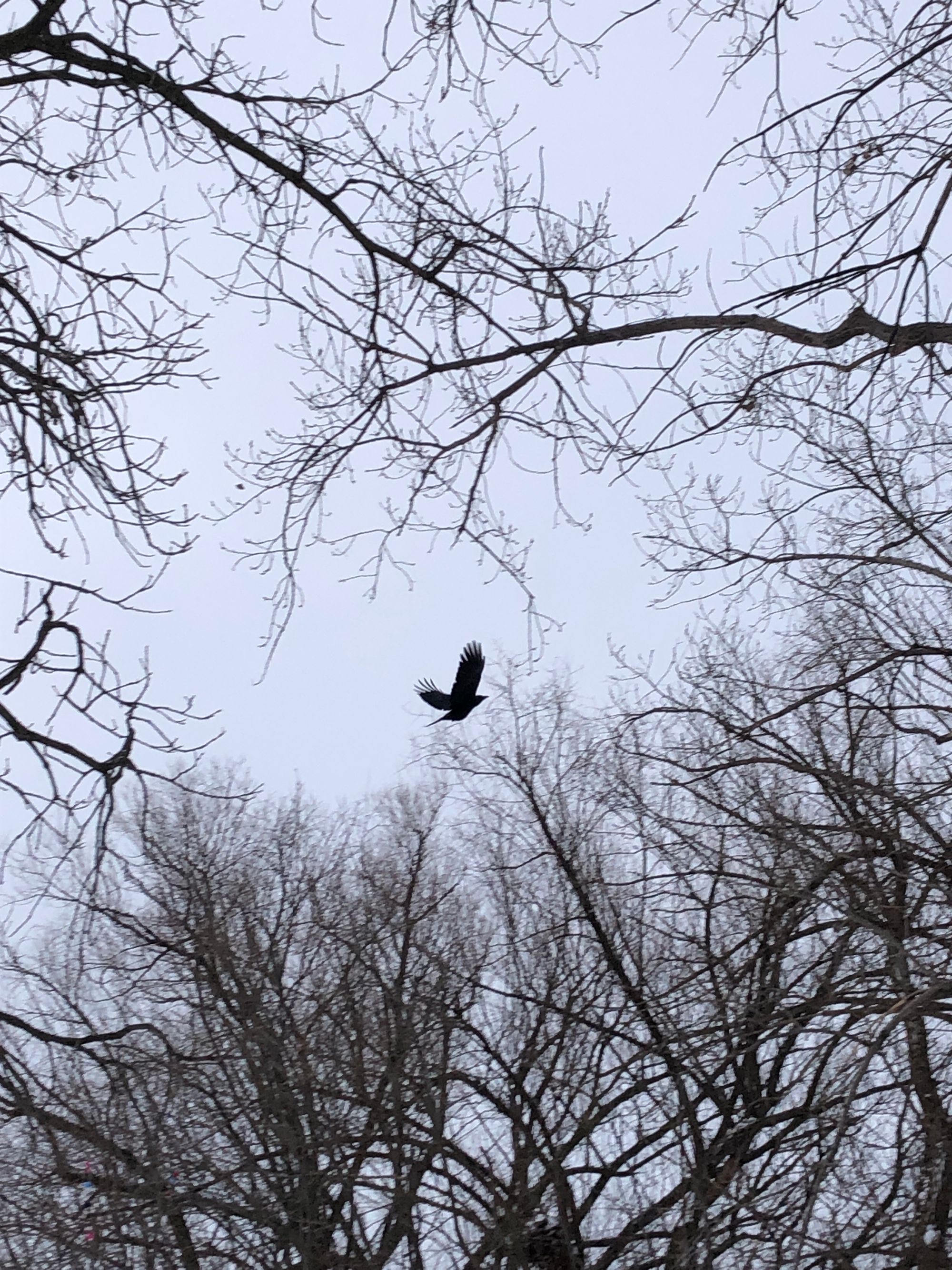
Part 1: Anxiety Made Me a Bad Reader
I’m going to begin this talk with a sort of apology. I was approached to write this keynote towards the end of September, and in the very thorough email inviting me to write a speech, I saw the words "Our theme for this year's con is creating communities of care."
I immediately panicked. What, I thought, do I know about creating communities? Absolutely nothing. I know nothing! I might have possibly, once upon a time in my early 20s, known something – a very strange thing to say in and of itself – but sure, maybe at the time when I had the boundless energy and foolish confidence to launch a poetry magazine with my friends Jessica Wick and Oliver Hunter, maybe then I knew something about building community. That was in April of 2006, fully 16 years ago, and at least three internets ago. We called this magazine Goblin Fruit, and it brought more into my life than good poetry. It brought me real delicious friends, friends with whom I'd make art in turn, like C.S.E. Cooney. Friends who'd come to edit Goblin Fruit alongside me, like Caitlyn Paxson.
But Goblin Fruit's been on hiatus since 2016. And six years is a long time in which to forget things and get tired and allow thorns to kind of grow up around the thing to which you'd like to return. My point is that if ever I knew something about how to build a community, I was absolutely certain I’d forgotten it.
In fact, not only did I know nothing about creating communities of care, I was reading Augur Magazine's invitation in the immediate wake of a tremendous experience of community building. I'd just returned from a week at an artistic residency called the Wayward Retreat out on Quadra Island in British Columbia. Every day spent in that magical place had made me feel deep-rooted awe in the care and consideration that went into building a specifically artistic community.
So I had been the beneficiary of someone else knowing how to build community. But the idea that I myself knew anything about that – beyond to praise them with great praise – seemed a little off. In fact, I was so panicked by the prospect that I had somehow misrepresented myself – that I had accidentally conned the fine people of Augur Magazine into thinking I knew anything about their very important stated theme – that I didn't realise I'd misread the invitation.
The paragraph informing me about AugurCon's theme this year concludes with a very clear sentence: "While 'creating communities of care' is our theme, however, you are welcome to craft your speech in any direction you prefer." (emphases mine.)
Anxiety had made me a bad reader. In fact, to my great shame, I put off responding to this email for some time. It took an in-person intervention from Terese Mason Pierre to free me from my anxious prison – took her literally coming to find me in person at a cafe in Ottawa, and telling me that I could in fact write about anything I wanted – before I very sheepishly accepted this invitation.
But not before getting a little further confirmation.
"When you say I can write about anything," I said, "you mean I can literally write a speech about birds?"
"Yes," said Terese, with what I can only describe as patient bemusement. "You can literally write a speech about birds."
So I decided to do exactly that. Brace yourselves, friends, because for the next 30 minutes, I'll be talking a great deal about birds.
Part 2: Talking About Birds
Or at least, I was going to do that. Ha-ha, plot twist! I was going to write about birds. I was going to tell you about all the things I love about birds and birding; that would have taken at least 10 minutes. I would have told you about how birds are instrumental to my teaching creative writing, and how for years, I used a bird-related exercise to get students to understand that we write from unexamined defaults.
In fact, I'll give you a small taste of this exercise. Prepare yourselves for pedagogy. In your various chats and streams on Discord, on YouTube, wherever you are experiencing this talk right now, prepare yourselves to post something. All right, I'm going to ask you to do something. Here we go. Don't think about it too hard. I want you to write down the first bird that comes to mind when you hear the word bird. Don't think about it too hard, just write it and post it right now. I'm gonna give it a second.
My hope is that you are presently reading the responses that have bubbled up around yours. So the purpose of this exercise is to, first of all, recognise that everyone has a different default bird in their head whether or not they know anything in particular about birds, whether they are experienced birders or amateurs, or whether they have literally never given any thought to birds outside of the weird exercise their professor is momentarily asking them to do.
Then you build on that. You start to ask, what traits define a bird for you? Is it flight and a beak? There are birds that don't fly. Is it webbed feet and a bill? There are birds that don't swim. You have to start asking yourself: what does a hummingbird have in common with an ostrich? And all of that weird perusal of birds is in service of establishing that we have different expectations and assumptions structuring our imaginations. And it does us good to unpack them and share them and delight in them together.
I was also going to talk about birds and divination. I thought it would be very, very clever of me to write about auguries for AugurCon. I thought, I'll tell people about how interesting it is that the word “augur” is both a noun and a verb; that an augur is someone authorized – this is very important – authorised to interpret the flight of birds. But the flight of birds itself augurs something, in turn, and isn’t it fascinating there is this reciprocal sort of relationship at the level of grammar.
I was going to tell you how it says something about readers and writers – something about how birds fly without knowing how their flight will be interpreted by the weird jogging apes below them. I was going to tell you that augurs have a lot to do with science fiction especially, reading signs in the present to say something entirely speculative about the future.
All this stuff, obviously, is known to the brilliant people who have put together AugurCon and Augur Magazine. But I thought, you know, why not tease that out, why not tease that out specifically to make it about birds.
Finally, I thought, I'll tell people about how important birds have become to me personally in the last three years. How I have a yearly ritual in which I step outside on January 1 to look for a bird, and that the first bird I see on the first day of the new year will mean something to me about the coming year. And whatever that means is not something that I interpret according to books or associations that you find in literature, but actually something drawn out of the strange complexities of the moment, of the context that I have brought to the bird that I behold on that first day. How, for instance, I decide whether the first bird I hear or the first bird I see is my first bird, all of that weirdness that you kind of run through the filter of your own presuppositions and the things that you need from the world.
I thought, I'll tell people about how birding, especially learning to bird by ear, feels like learning a new language (even though I have no expectation of ever being understood by a bird) because the thing that makes me feel like I'm learning a language is the fact that I'm making my environment more legible in a way that it wasn't before.
I was preparing – I cannot stress this enough – a speech about birds. But then, Elon Musk bought Twitter. And I realised that I did actually have things to say about community, and the things that are important to building it and preserving it. So I hope you'll indulge me in this despite having led with a great deal of assertions to the contrary.
Part 3: The False Promise of Hawks
So let's talk about bird apps! I've been thinking about birds and Twitter in tandem for some time, in literal and figurative ways of various depths and complexities. In fact, Twitter recently provided me with that species of roast we call a personal attack while actually meaning that we have found joyful recognition in it. So Jesse Case, in an inexplicably deleted tweet, wrote:
As you age, it's ridiculous how fast bird-watching creeps up on you. You spend your whole life being 100% indifferent to birds, and then one day you're like "damn is that a yellow-rumped warbler"
While I cannot remember a time in my life when I was 100% indifferent to birds, the spirit of the observation stands. I am in this tweet, and I do like it.
Anyway, Twitter and birds. Let's start with the obvious. Twitter gets called "the bird app." It's got a little stylized bird shape as its logo. And that logo bears about as much resemblance to an actual bird as a tweet does to a conversation. The utterances we make there are called tweets, which is a thing that birds do, although that, too, is an absurd reduction of something of tremendous complexity we only dimly understand. But there are currently two other bird apps in my life besides Twitter, though they're very mixed up with it and its usage.
One of them is not strictly speaking an app, but it is a game that I play on the computer, so bear with me. It's called Wingspan, and it's a game in which you semi-competitively build up a presence of birds in different habitats to the sound of a truly gorgeous soundtrack.
(It exists – brief digression – in a physical format as well. That's how it existed first, but I really do feel that the online experience of the game is that rare occurrence where the translation to a digital medium has improved it. Now there is a soundtrack and beautiful little animations of the beautiful bird art. It's tremendously soothing, to the point that when I go out walking, looking for birds, and I see one, I start hearing the soundtrack in my head. So anyway, Wingspan: beautiful game. It's like if Ticket to Ride were relaxing.)
The other bird app is Merlin, which is put together by the Cornell ornithology lab. And it's basically somewhere between Shazam for birds and a real-life Pokédex. It helps you to identify birds around you, either by taking photographs of them, or by recording the sounds that they make.
So the way it works is that I walk around outside with my phone held aloft, recording the dawn chorus, and the app lights up with the different birds I'm hearing. It's often happened that I've never seen the birds in question before, or never realised that I'd seen them.
Often language gives us the means to perceive elements of our environment which we might not have been able to do before encountering the words for them. For instance, I recently learned that my husband did not really know what birch trees were, or that they existed. I told him that there were white trees, and he just did not believe me, despite having seen birch trees many times in his life. But now that he knows the words “birch tree,” and that they refer to a white tree, he sees them everywhere. Anyway, language structures our experiences. (Linguists please don’t @ me.)
But my point is that you walk around with this app, and you see it light up, and it gives you information about your environment that you did not have before, and it gives you the means to interpret it. So the app will give me information about the appearance of birds that I haven't seen, sometimes their behaviour, enough that I can trace the source of their songs to their origins.
So I can be hearing a bird and not realise that I've heard the sound a million times before, but now that the app has isolated it from the general dawn chorus, from the general mass of things, I'm paying attention to it. And so if I look towards the source of the sound and I know what to look for, I can maybe spot the bird that was making that sound and have a new relationship with it.
Thanks to this app, I saw – in the way that "seeing" means "recognise, acknowledge and appreciate" – a warbling vireo for the first time. I can tell now when yellow-rumped warblers are around just by hearing them, just by listening for them. And I can recognise the little heart shaped divots in their tails as a tell if they're not singing.
I don't know if you can tell from the way I'm talking about this, but this has brought great joy into my life. It has made me wake up earlier to find my way into parks and along waterways, just as the dawn is breaking, when there are fewer people around, in order to find birds. It's made me go on longer walks, and enriched those walks with wonder.
But Merlin isn't perfect. It's a tool, and a tool that has a certain degree of failure built into it. It has a very high rate of accuracy in identifying the recordings that you are putting into it. But it can be fooled. I learned this one day when I stopped along the river, hearing a strange loud rippling call from a ways away, too faint to really catch with the app from where I was standing on my side of the river. But it intrigued me, and I'd never heard anything like it before.
So I started to kind of foolhardily venture out onto some rocks, onto the river, to precariously just, you know – laugh at me as you imagine this – perched on a slippery rock, trying to hold my phone as close to the source of the sound clearly emanating from the other side of the river as possible, so that I could capture it in the app and learn something about the bird that was making it. I eventually managed to catch enough of it for Merlin to give me an ID: it claimed I was hearing a sharp-shinned hawk, which I've never seen before, so far as I'm aware, and certainly didn't know the sound of. But then, seconds later, as I continued to record, it said that I was hearing a Cooper's hawk.
Both of these hawks would be rarities for me, so-called lifers. Both possibilities had me deeply excited; but which one was it, was it the sharp-shinned hawk or the Cooper's hawk? Or were they both here? And that would be very weird and special, wouldn't it? I didn't see them that day. But the possibility of seeing them took me back the next day, and the following, in hope of glimpsing these birds and, you know, logging them into my Pokédex. And then I realised, as I stood there, like literally on day three or so of this endeavour, I realised that the sounds were weirdly regular, that there was something maybe slightly off about the situation.
And as I looked at my surroundings I took in a number of things. Took in the relative chillness of the birds that were around me, that didn't seem to be particularly affected by these hawks. And my vague sense that raptors tend not to be near each other too much. And the fact that those are just not birds that I expect to see at this time of year, in this place.
I suddenly put together the fact that I was not hearing hawks at all; I was hearing a recording of hawks. I was hearing recordings of hawks that were being broadcast by a high-rise across the river to scare away pigeons.
I began to feel very silly. I felt like I had been tricked. And I got angry at the app for failing to, you know, give me this information, and making me feel like a bit of a fool.
I was excited by the false promise of hawks. But the intention of the recording was to scare away pigeons with the false promise of hawks. I turned up day after day expecting to see hawks, but the intention – I can't actually tell how well this worked, I could not see whether there were pigeons standing there like crows on a scarecrow, just totally showing up the failure of the mechanism – but the intention of this device is to confuse pigeons and prevent them from congregating. To have a bad threat assessment, essentially, of the area.
In either case, me turning up hoping to see hawks, or the pigeons failing to, are both failures of interpretation: using one flattened, out-of-context utterance to arrive at an erroneous conclusion. I don't know if you can tell which bird app I'm talking about any more.
Part 4: What Twitter Gave Us and What We Took
Now, for the last several months, I've been using the good bird app to make the bad bird app more bearable. I go on long morning walks to encounter birds, delight in them, and then bring that delight back to Twitter in photos or descriptions. My hope is that I'll interrupt someone's doomscrolling with a photo of a snowy egret, or news of a black crowned night heron, or my excitement at successfully identifying an American tree sparrow.
But it's also been a kind of bribe to myself: if I leave my apartment early enough in the morning and fill my head with birds, there's less room for all the other stuff. Using the bird app to talk about birds is a medium-funny joke that I keep making, but there's a kind of desperation behind it. If we talk about birds, I hope maybe we'll remember how to talk to each other joyfully. And, hopefully, maybe we'll remember how to listen to each other and hear something other than the sound of raptors closing in.
Now, I say all of this sort of anticipating pushback, because I've been seeing a lot of it on Twitter lately. Twitter is very bad at allowing two different ideas to exist in the same place at the same time. And the keenest proof of that to me is just watching people talk about what we're losing when we lose Twitter, something which is happening in fits and starts, and truly astonishing layoffs, and all sorts of other horrible things which the current buffoonish billionaire who owns Twitter is doing to it.
So what I see is people on Twitter talking about Twitter in terms of, on the one hand, a hellsite, right? I have certainly called Twitter a hellsite. A bad, bad place where you go to become unhappy. A bad, bad place where you doomscroll until something – perhaps the image of a bird! – interrupts it, and you think, maybe I should go outside. A place for bad faith interpretation, for general unpleasantness, for things that ramp up your adrenal system and cause you to feel all kinds of shaky, bad things throughout your day.
People encounter this description of Twitter as a hellsite and they say, How dare you, actually. I – it is me talking to myself here – I, for instance, have made a number of important professional contacts through Twitter. I met my literal spouse through Twitter, I have used Twitter to find friends, to build connections and relationships that have been enormously nourishing and sustaining to me during very difficult times. How dare you – I! – call Twitter a hellsite.
And the frustrating thing about this is that it is proving that initial point. It cannot somehow be both: it cannot both be a hellsite, and also a place where people find community. It cannot both be a place where, for instance, you can accomplish all sorts of worthwhile activism that you couldn't before, but also be subjected to truly incredible kinds of harassment that didn't exist before. These are things that should not be at odds, that should be able to be united within the one greater truth: that Twitter is a tool, and that a tool can be used in different ways. Against the people who have embraced it, or in their favour.
At the same time that Twitter brought me some of the most important relationships of my life, it also brought us a Trump presidency. I say “us” here because, without being American, the rest of the world has also been subjected to the obvious hegemony of that presidency. All of these things are true. These multitudes should be contained within this one site. But its very protocols make impossible the co-existence of those two truths. Instead, any time Twitter encounters difference, it creates out of that difference an opposition. Things can be different from each other without being opposite to each other, but not on Twitter.
And out of those oppositions it creates oppressions. So that disagreement with someone about something which, outside of Twitter, might not have been a friendship-breaking ordeal, on Twitter gains all kinds of layers of scrutiny and misreading and misinterpretation, because, as I said at the very outset of this talk, anxiety makes us bad readers. Anxiety can make us paranoid readers, and where we are experiencing anxiety and paranoia, we might miss the things that are, for instance, someone kindly and joyfully offering us the opportunity to speak about something that we care about.
Twitter brought very good things into my life. And yet, over the last several months, I have been trying as hard as I can to spend as little time on it as possible, because it became a place that was no longer serving my needs. It became a place that was inimical to me, and to the friendships that I had made there, and to the art that was being supported by the connections that I had made there.
But I'm very, very alive to the fears that people have with its loss, the clamour that people are making about how they don't know how they'll support their magazines, or their livelihoods, or any of the things that they use Twitter for. But to this, I want to say, with the fullness of my heart: Twitter did not give you community. You snatched community from the jaws of Twitter. From the jaws of the algorithm, from the toxic engagement that was supposed to prevent community in the first place.
You cannot approach community as a service that is being provided to you. Community is something that has to be engaged with in a spirit of mutuality and reciprocity. And at this point, I want to make a sort of truck driver's gear change to talk about the Wayward retreat, which I mentioned at the beginning of this talk.
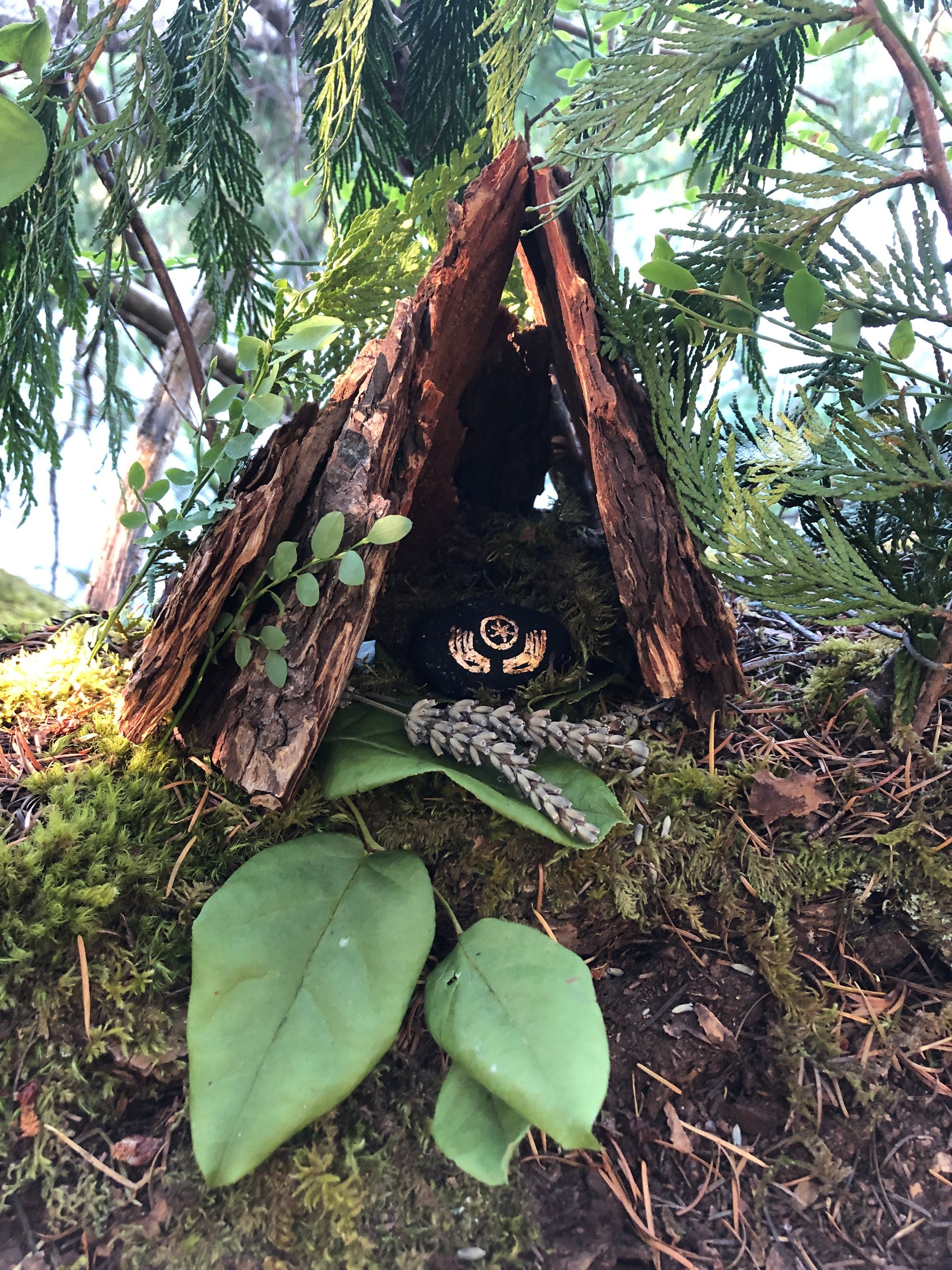
Part 5: Wayward Communities
The Wayward retreat is a truly marvellous endeavour -- a space curated for artists to come together in a spirit of mutuality, collaboration, and a kind of quiet sociability. I want to talk about the things Wayward taught me about community – things I hadn't realised that I had learned until I watched Twitter spiral apart.
First: boundaries are not the same thing as gatekeeping. If you look at the Wayward website, you'll see that in addition to a code of conduct that’s both generous and comprehensive, it's doing a number of things that we might not usually associate with building community. One of those things is that it is very explicitly not trying to be everything for everyone. It says at the outset, in its frequently asked questions – in fact, why don't I just literally read it from the FAQ, which I have in front of me:
I DON’T REALLY WANT TO SOCIALIZE. I JUST WANT TO GO TO THE WOODS AND WORK A LOT. IS THIS RETREAT FOR ME?
Probably not. Though this retreat dedicates most of your time to solo work, there are multiple group activities throughout the week. We find the community atmosphere is an essential part of the experience and creates a positive effect on the work created here.
Another question:
I HAVEN’T MADE MUCH ART YET, BUT I’D LIKE TO START. IS THIS RETREAT FOR ME?
Probably not. It is intended for artists already pursuing their craft with full-time intention (even if they hold down day jobs to pay the bills.)
A boundary is not the same thing as gatekeeping. And yet we often conflate those things. Here I see Wayward organizers telling prospective attendees “this retreat might not be for you, not because you are being barred from it, but because it will not actually serve the things that you need.” It's very important to recognise that you are not being rejected by being told ahead of time that the things that are here are maybe not the things that you need; you are, in fact, being seen and being appreciated in your difference.
Next: Share in the work. A simple but crucial element of the retreat experience is a carefully crafted chores rota. You have to, when you are at the retreat, wash dishes, help prepare meals and clean up after them. This made clear that even though one person was cooking for everyone, over the course of the week everyone played a part in appreciating that gift by sharing in the labour that made it possible.
It was wonderful to appreciate how much friction or disagreement or bad feeling that could arise among fourteen people was simply eliminated from the equation by this one simple provision. I was so grateful to be told what to do, grateful to have been invited into the labour required to keep this community running.
Finally: Strictures as structures. There were times of the day and spaces in the building that were marked out for quiet work. A ringing bell and friendly signage signalled that quiet time had begun or ended, that this living room was not presently a place for sustained conversation. If you wanted that, you had to go elsewhere for it – outside into the garden or woods or lake.
These limits helped structure our experience, and gave us a firm sense of what we could do in what space when, with plentiful opportunity to explore and enjoy ourselves outside them. And from those strictures, all kinds of good things flourished: the chores rota, for instance, had been organized to prioritize pairings of people who hadn’t yet had one-on-one conversation time in other activities, so that everyone was getting a chance to have a kind of interaction that could allow deeper connections to take root.
Understand, too: we were all strangers to each other as we arrived in this space. The amount of care required to think about what, not just one person, but what a group of people new to each other might need in order to allow harmony and fellowship to grow between them – to transform them from strangers into people who shared a community – was dazzling to contemplate.
I'm belabouring this because I want to build up to the most wonderful part of the retreat for me – beyond the incredible food we were being served, beyond the natural beauty of the location, beyond the fact that it was totally off-grid and we had no access to the internet unless we wanted to literally climb a mountain and hold our phones up in order to get one bar of reception. (Only one person did, in order to receive new baby photos.) Threaded throughout the experience of this retreat was a collaborative piece of art that took the form of a game of artistic Telephone, played through the geographic space we were inhabiting.
It worked like this. After an initial catalysing prompt given to the first participant, each of us, over the course of the whole week, were given a two-hour chunk of focused time in which to produce an artwork based on a prompt from the person who’d just completed theirs. So one person gets this prompt, creates an artwork or an experience, and then distils that art or experience into a representative fragment small enough to fit into a glass bottle. And that bottle and its contents become a seed of inspiration passed on to the next person in the chain, who will then, in turn, create something inspired by that small thing.
What was in the jar varied. I did not realise this at the time because we were all being very carefully insulated from each other and from what the whole experience was going to look like. (“It’s not being kept from you,” we were told. “It’s being kept for you.”) So when I received my bottle, in it was a sheet of paper. And there were drawings on it, things that were suggesting sound and vibrations. The thing that most struck me though, was that on the outside of it were the words, "you are safe."
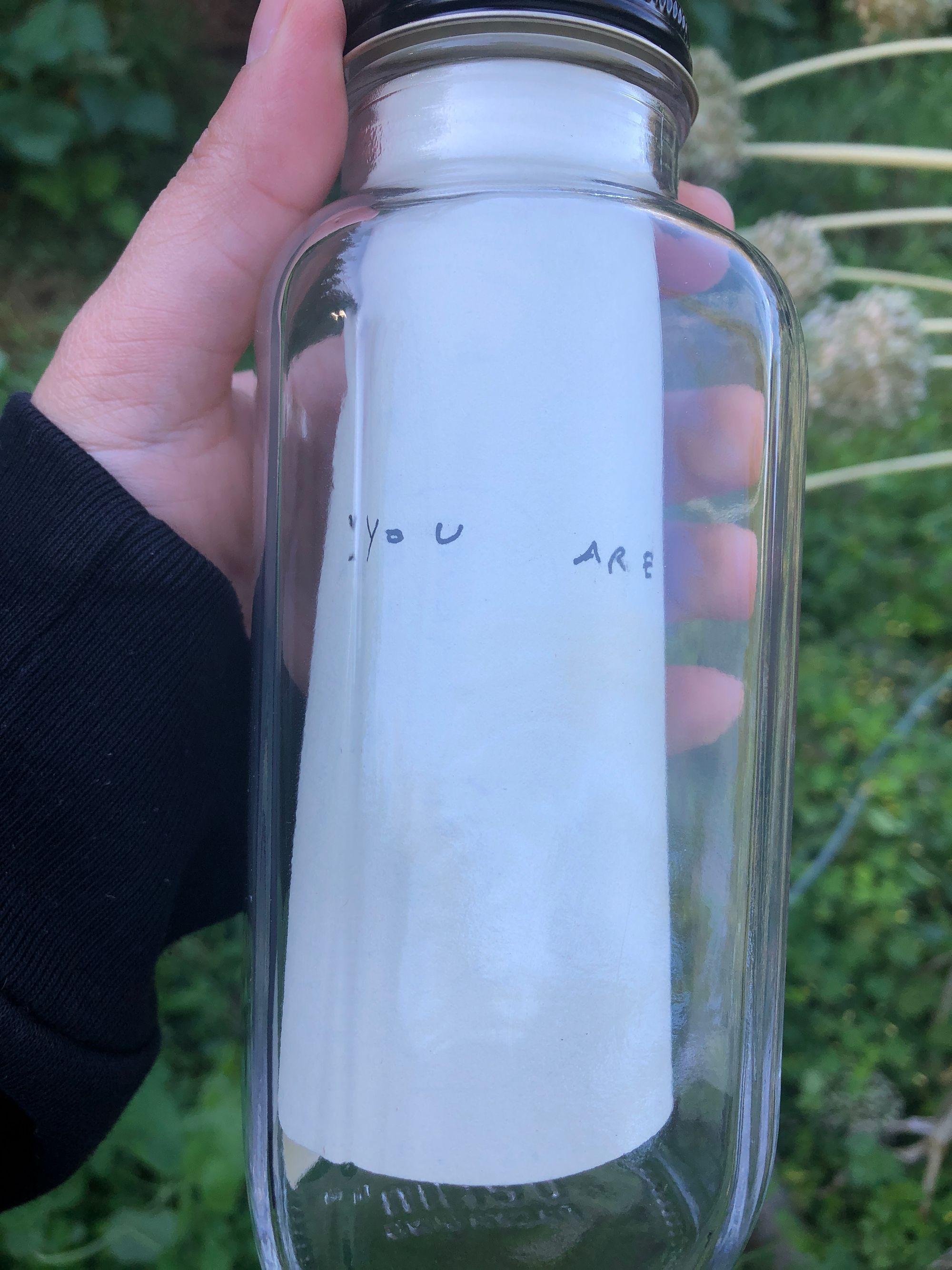
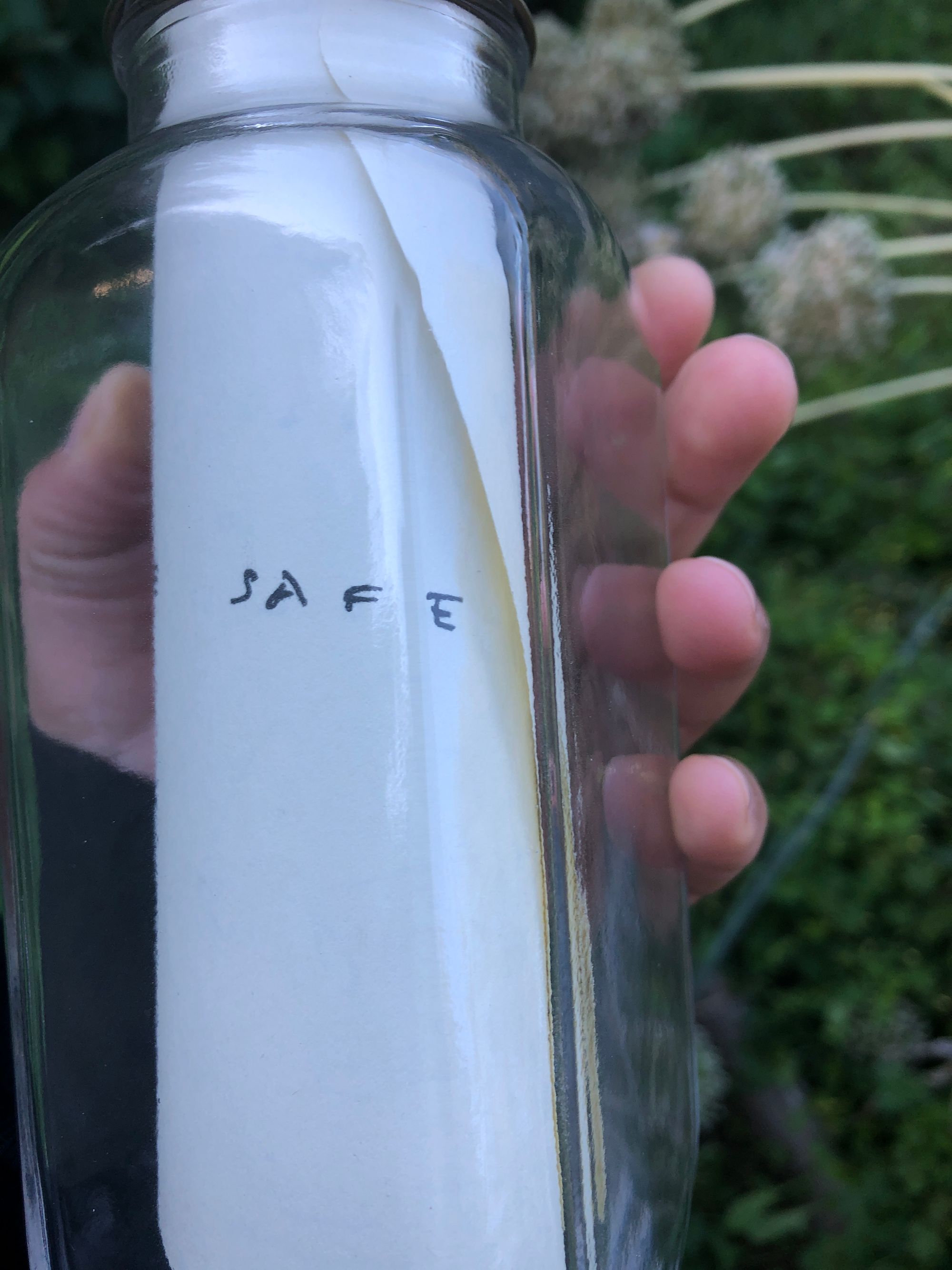
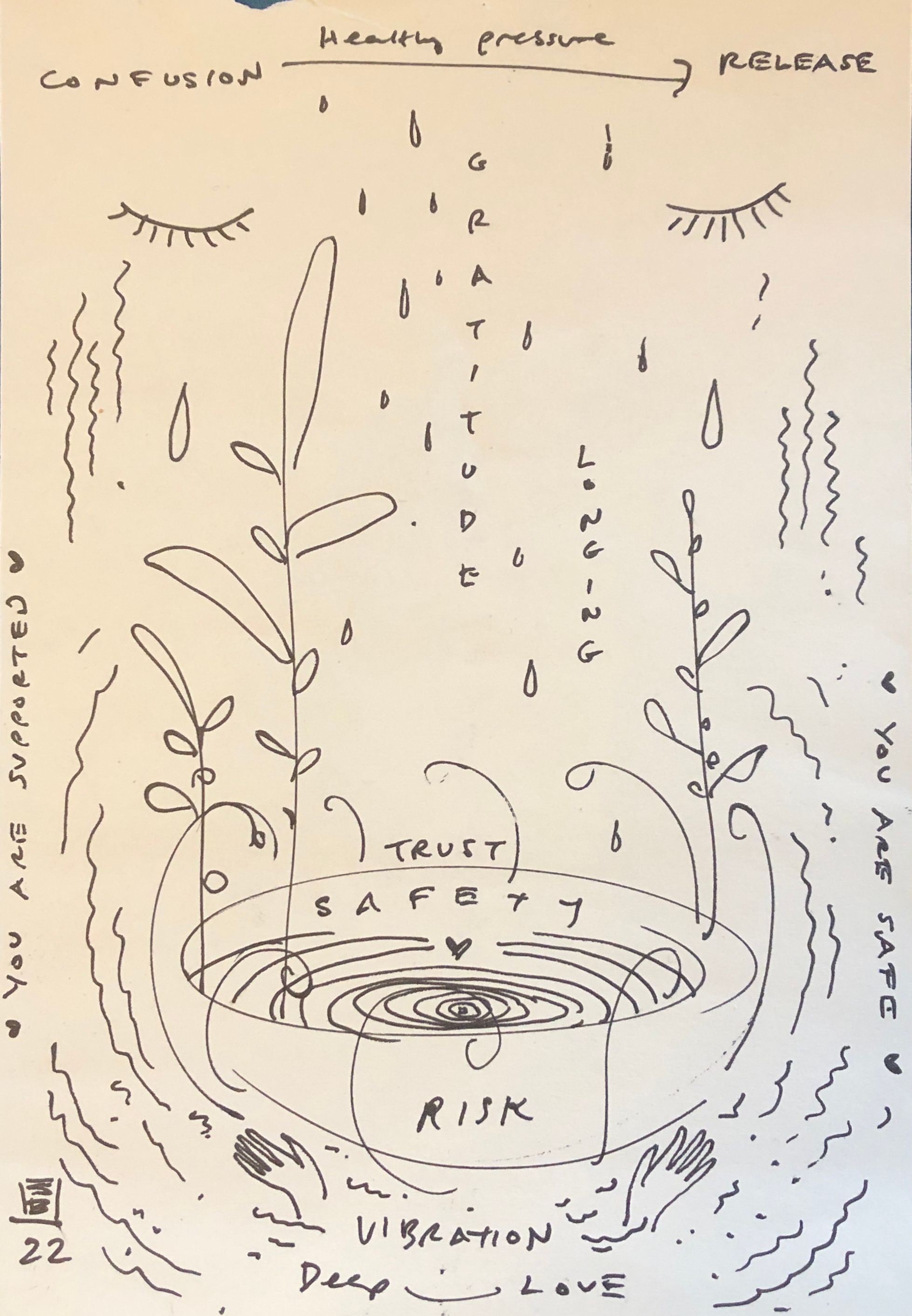
And I had to take this and build something with it.
Now, we had been instructed to try and move outside of our comfort zones in this. If someone was a visual artist, they were encouraged not to lean on that skill set, but to try and push themselves in a different direction. I'm a writer, and I felt that trying to do something that wasn't just putting words on a page was maybe what was being asked for here. But I was also terrified.
I have this sort of chip on my shoulder about writing as an art form, that I think many writers do. Or maybe it is just me, I don't know. I certainly sometimes remind myself that writing is, how can I put this? Obviously, writing is an artform, I don't have any problem remembering that. But there is a certain kind of reverence that I have for a tactile object that is created by a person, whether it's fibre art, or painting, or drawing, or sketching, or sculpture, or anything that involves making something physical, that I feel is distinct from writing. Which usually is, you know, imaginary pixels on a computer somewhere that just lacks that physical aspect.
So I thought, instead, okay, well, what else do I know how to do? I know music; maybe I'll write a song? Maybe I'll do something that involves singing? And then I thought, oh, yeah, maybe I could do something where I get a bunch of people together to sing. And as soon as I thought that, I became very, very anxious, thinking about how could I possibly craft this experience in two hours.
I wasn't seeking the consent of the participants in it. I knew that this was going to involve everyone on some level, but I didn't have the means of asking people, did they feel comfortable singing? Did they have a lifelong fear of lifting their voices in song? People can feel very anxious about lots of different things. And I didn't want to tread on that, in this space that had been so carefully curated for us to do something beautiful together with.
So I asked one of the organisers, who’s herself an experience designer, to help me out. I said, this is what I'm afraid of. These are my concerns. What do I do with them? And she said something that I will never forget, and that I treasure. She said: make them feel safe enough to be brave.
I suddenly knew what I wanted to do. I realised that maybe the way to make people feel safe in this particular situation was to make sure that everyone had a very, very small role, a role that could potentially be opted out of if necessary. Something not unlike a chores rota.
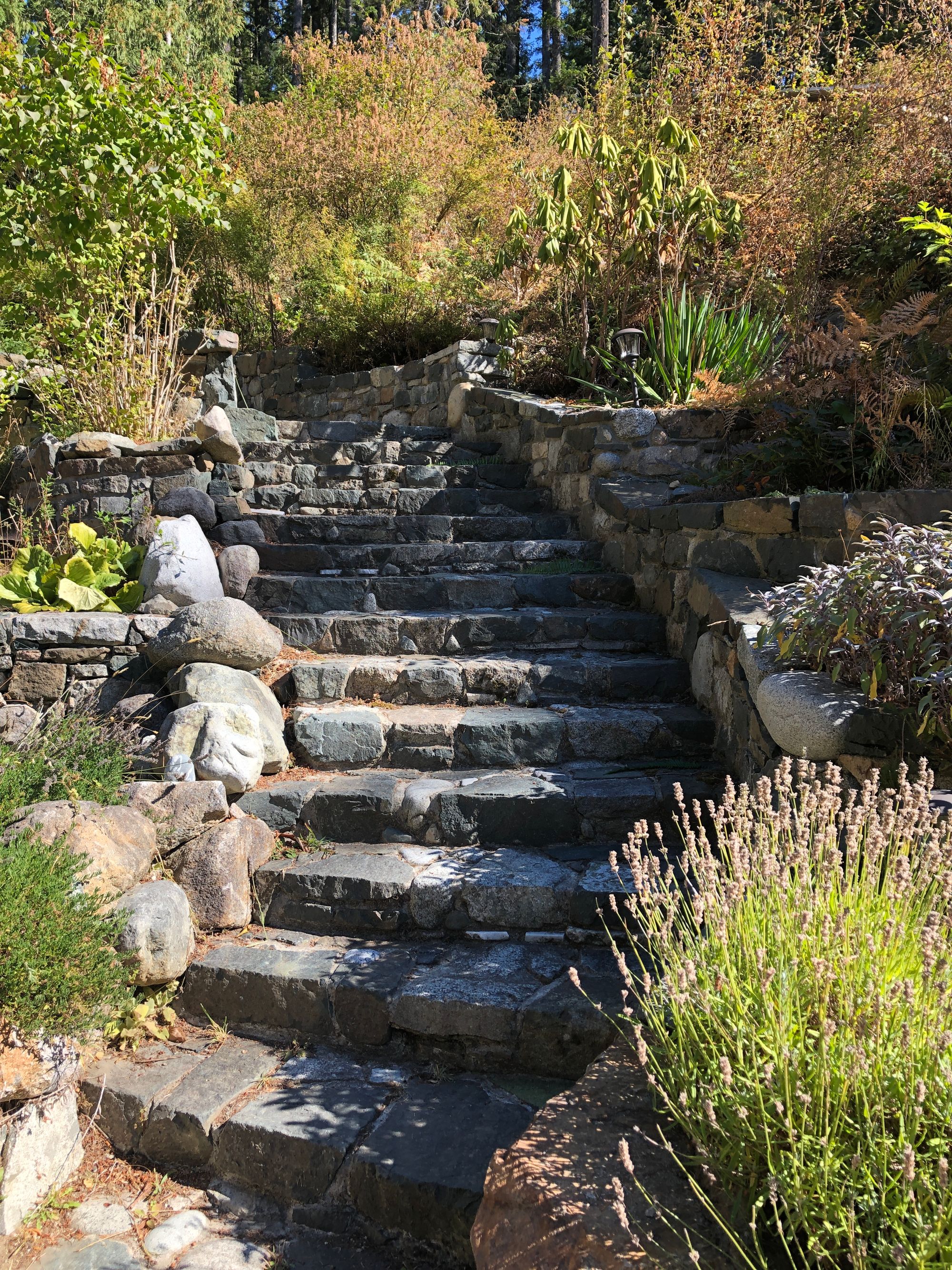
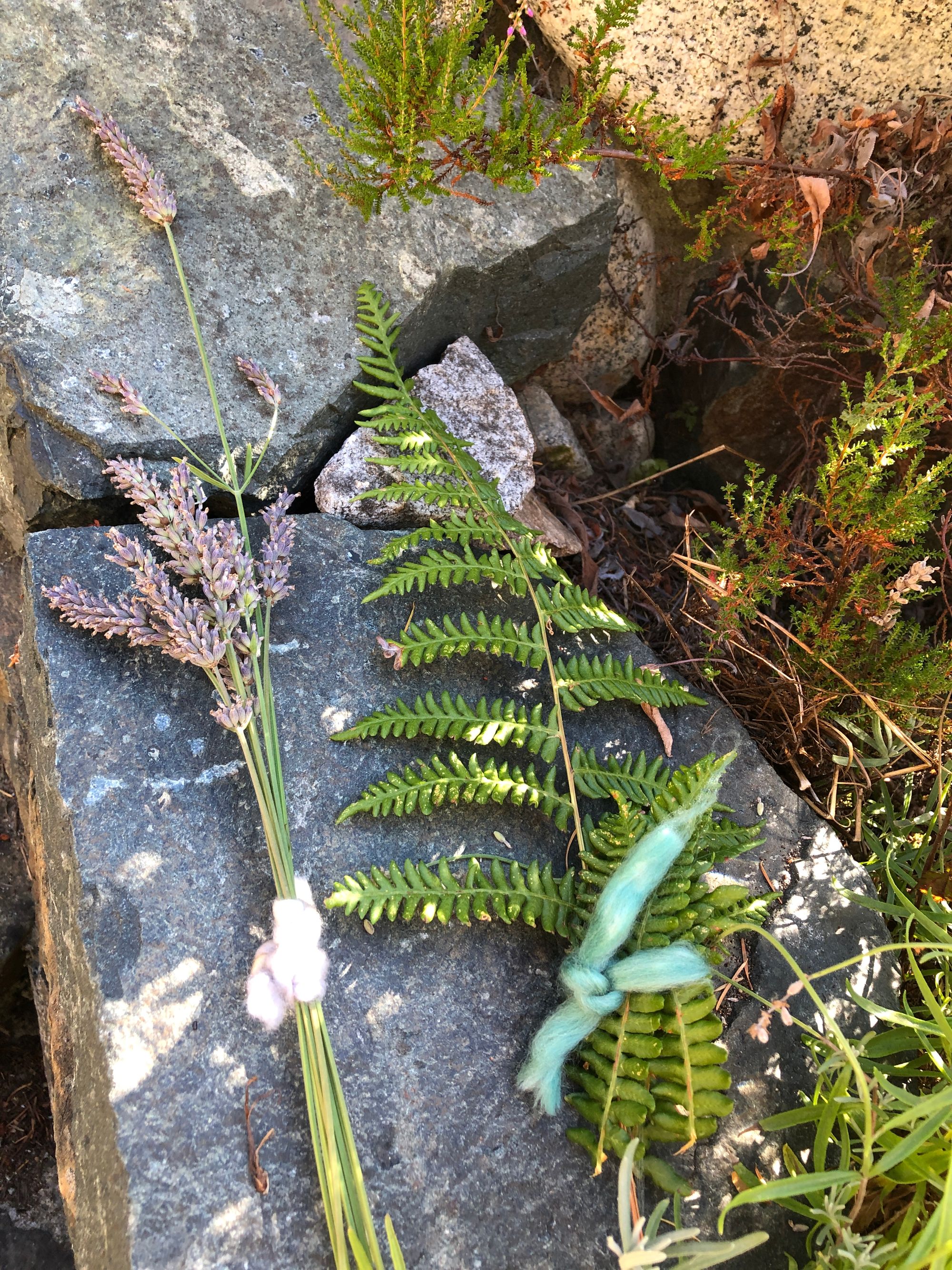
I gathered long sprigs of lavender and sword ferns. On a tall stone staircase, I marked some steps with lavender and some with ferns. When the group approached me, I gave them either lavender or a fern and sent them to stand on the appropriate steps until the staircase was filled. And then I conducted them as if they were parts of an orchestra, directing them to clap or hum based on whether they were holding ferns or lavender, to build their confidence in making music together without engaging any fear of singing. Then I made them stop, and I talked about the difference between singing and speaking and how much I wanted to hear their voices in the world.
And I saw, and I could feel, that there was a kind of circuit humming between us, as a consequence of the care that I had taken in giving people small things that they could accomplish together. I sought to make them feel safe enough to be brave with me, in lifting their voices in song with me, after teaching them a single line with a simple melody. To bring this back to birds – it’s a line from a poem called Matériel, by Don McKay: "To dress up like the birds and be and be and be."
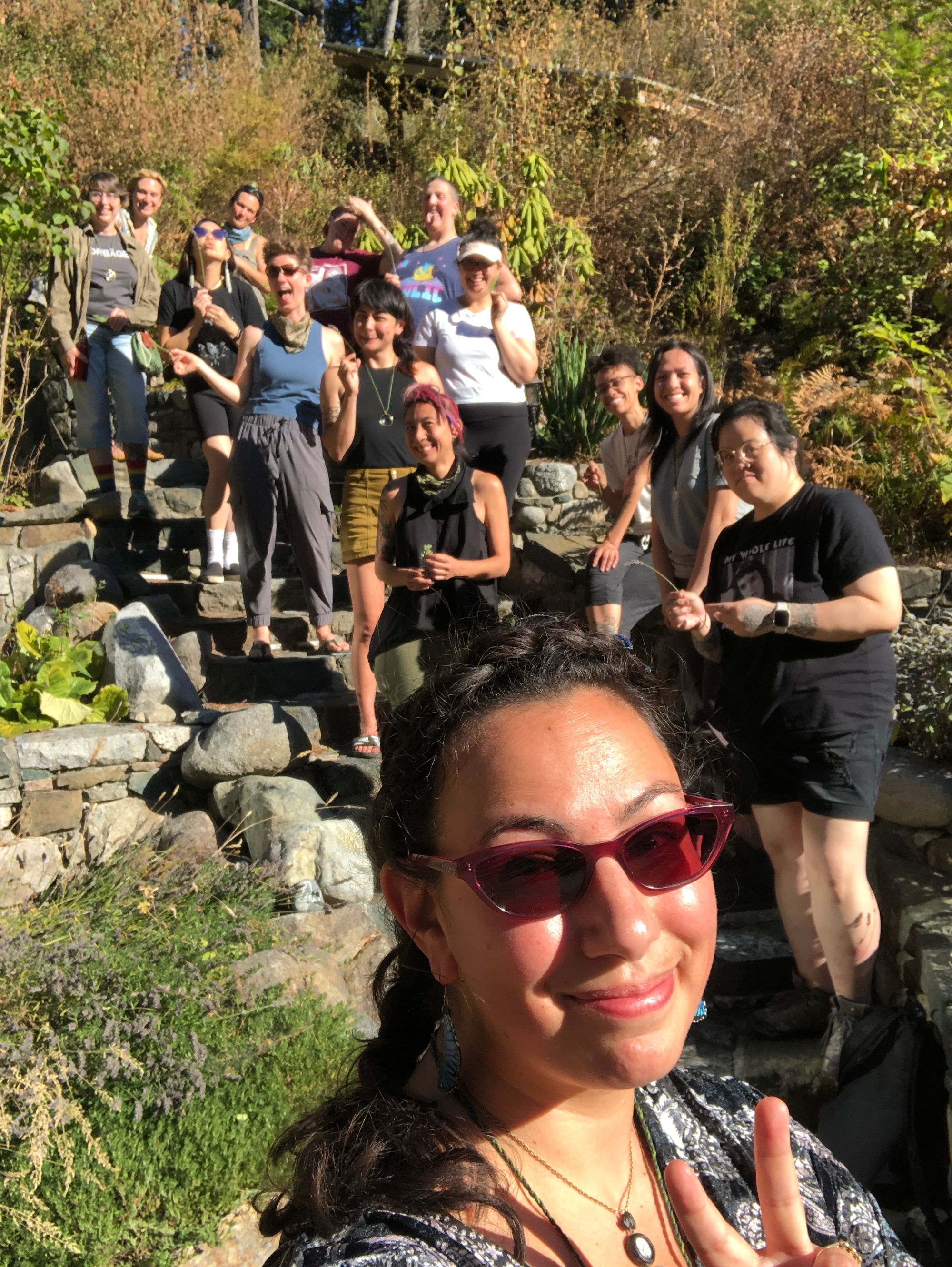
It was a profound experience for me. It is perhaps one of the most beautiful artistic expressions it's been my pleasure to live so far. I felt like I had been given this enormous trust, and that I had managed to create the conditions for something beautiful and harmonic to arise from it. Some people during the singing literally took it upon themselves to harmonise, some of them just sang what I was singing, some of them hummed or clapped, and it all just worked. It all came together.
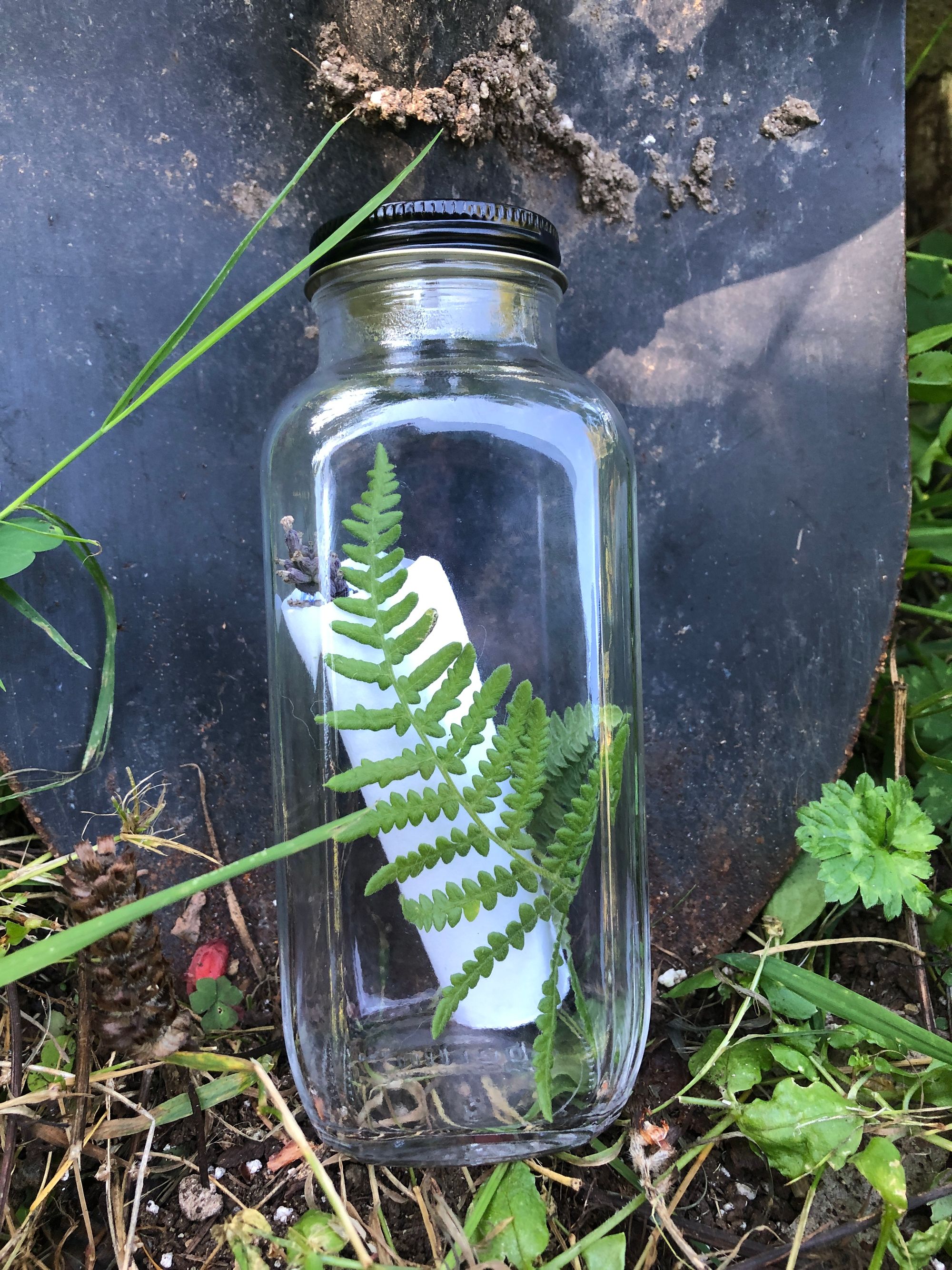
So I made it about birds, because of course I did. But the seed that I left for the next person, not knowing who it would be, was a bottle that had in it a fern, a sprig of lavender, and a piece of paper with my attempt at drawing feathers, and a few other things that ended up inspiring, for that next person, a kind of bird-related augury. Which I won't belabour, but which is my cue to bring this to the last thing that I really want to talk about here: augurs and auguries.
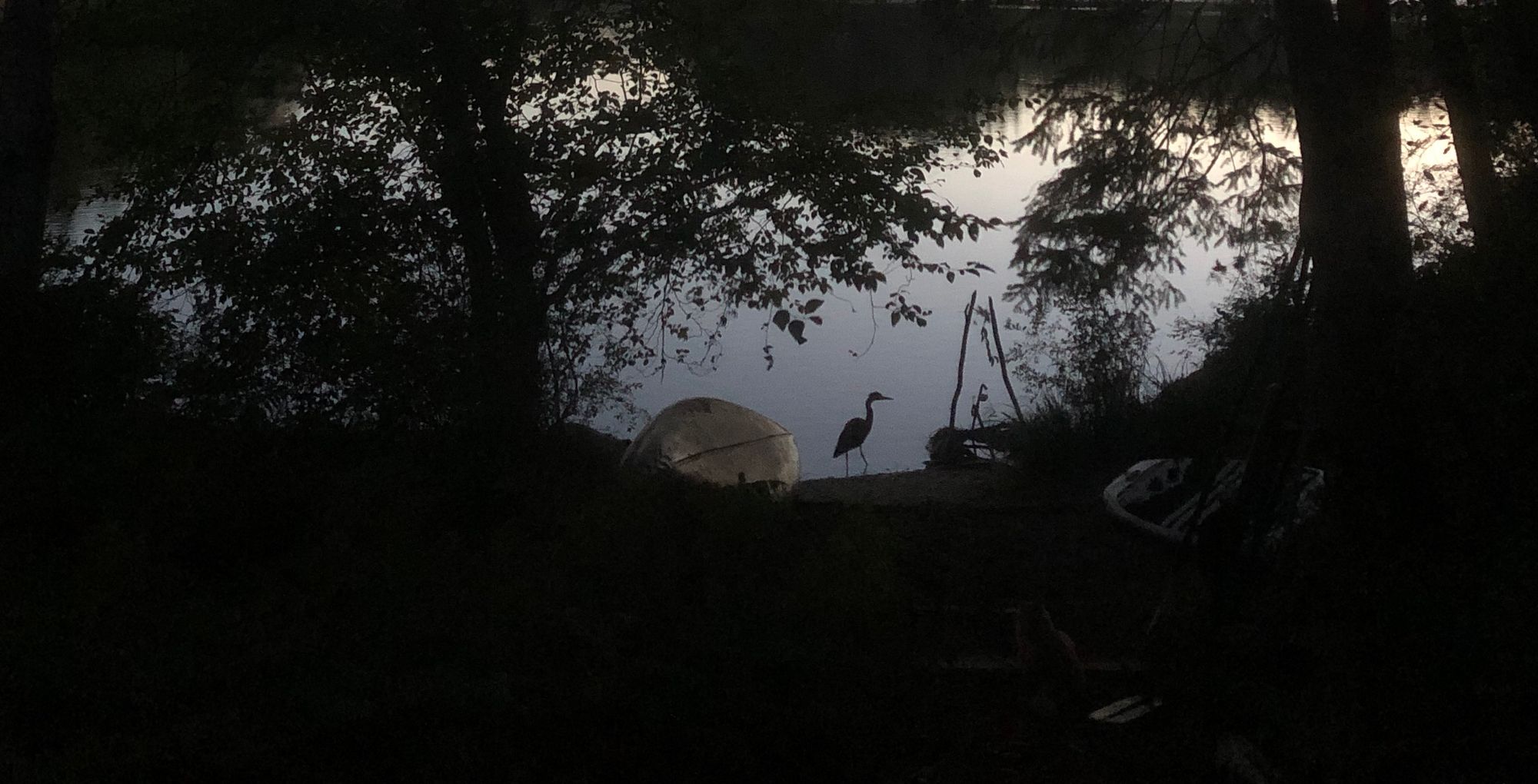
Part 6: Auguries
Tweets and auguries have this thing in common: they are both short, gnomic utterances, devoid of context and requiring interpretation. And one of the most famous uses of augury, which feels frustratingly relevant to the way that I see people speaking on the internet lately, is to do with the legendarium surrounding the founding of Rome.
Perhaps you know the story, perhaps you don't, but the general gist – there are many versions – is that there are twins, Remus and Romulus, who are abandoned at birth, exposed on the countryside. They end up surviving because they get suckled by a she-wolf, and they grow up together, they do a bunch of stuff. After a lifetime of gaining martial prowess and being generally excellent by the standards of pre-Roman excellence, they decide that they are going to found a city together. They want to set it on a hill.
If you know Rome (which I don't, actually, except out of English literature) there are seven hills. And there is some debate about which hill they want to build the city on. Will it be the Palatine? Or will it be the Aventine? Remus wants to found the city on the Aventine. (I really hope I get this right.) Romulus wants to found it on the Palatine. They cannot decide between them, and so they decide to turn to auguries. They decide that they are going to let the birds tell them where they should go to found their city.
Remus observes six auspicious birds hovering over the Aventine. Romulus observes twelve auspicious birds hovering over the Palatine. They start fighting, and Romulus ends up literally killing Remus, killing his twin brother. And Rome gets founded on the Palatine. There's the end of the story. There are other versions where Remus survives and founds a different city.
But the one that has come to me at any rate, and that feels germane to our social media moment, feels like this one. Two people, who are brothers, with everything in common, trying to decide where to go and where to build their community. And instead of finding a way to talk about this and build community together, they decide to kill each other in a spat about birds. Mastodon or Hive? Cohost or Instagram? Ah, where will we go? What will we do? Where will we end up? How will we continue to build our communities together and have our livelihoods? Sell our books, get people to read our short stories, fund our magazines, how will we do this?
Despite my forays into divination, I can't read the future. I cannot read this flight of birds around us right now, as people flee Twitter and try to build their communities elsewhere. What I can say is that AugurCon is fucking amazing. And it is run by people who are so dedicated to creating this space that is valuable and joyful and sustaining. And that makes room, that creates the conditions for the kinds of conversations, hopefully, to arise, that you might not find in a flattened recording-of-a-recording, contextless, dead, horrible, broadcast nonsense thing that makes you feel like there's nothing out there but hawks waiting to kill you. Or that might make a space uninhabitable to you because of the ways in which we fail to interpret each other.
I cannot read birds or tell this future, but I want to learn our voices. I want to see us thrive in our habitats. I don't want us to mistake a crowded hallway for a community. I don't want us to think that Twitter gave us something that we didn't give each other. And so many of those things that are important are generosity, and kindness, and good faith, and the willingness to just believe for a moment that the person speaking to you doesn't actually mean you harm.
I want to be able to tell the difference between a hawk and a recording of a hawk. I want us to be augurs and I want us to dress up like the birds and be and be and be. And I want us to give each other dusks and dawns in song. I want us to just give more and expect more of each other.
And I want to end, as I get a little weepy here, with a poem. It's a poem called “Why I need the birds,” by Lisel Mueller. You can find it in a collection that I highly recommend called Alive Together.
Thank you all so much for listening to me at such great length. Thank you so much to the organisers of AugurCon and the editors of Augur magazine for doing all the work that they do. And thank you so much for having me.
Member discussion